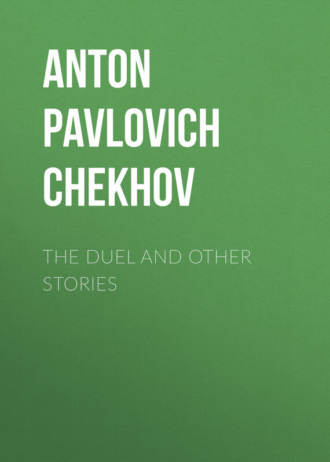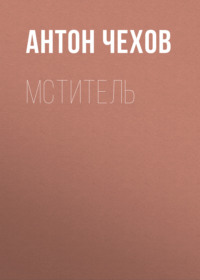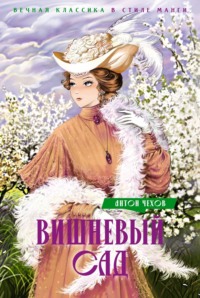 полная версия
полная версияThe Duel and Other Stories
"Perhaps," said Laevsky, who was too lazy to think and oppose him. "Though what is 'Romeo and Juliet' after all?" he added after a short pause. "The beauty of poetry and holiness of love are simply the roses under which they try to hide its rottenness. Romeo is just the same sort of animal as all the rest of us."
"Whatever one talks to you about, you always bring it round to
.." Von Koren glanced round at Katya and broke off.
"What do I bring it round to?" asked Laevsky.
"One tells you, for instance, how beautiful a bunch of grapes is, and you answer: 'Yes, but how ugly it is when it is chewed and digested in one's stomach!' Why say that? It's not new, and.. altogether it is a queer habit."
Laevsky knew that Von Koren did not like him, and so was afraid of him, and felt in his presence as though every one were constrained and some one were standing behind his back. He made no answer and walked away, feeling sorry he had come.
"Gentlemen, quick march for brushwood for the fire!" commanded
Samoylenko.
They all wandered off in different directions, and no one was left but Kirilin, Atchmianov, and Nikodim Alexandritch. Kerbalay brought chairs, spread a rug on the ground, and set a few bottles of wine.
The police captain, Kirilin, a tall, good-looking man, who in all weathers wore his great-coat over his tunic, with his haughty deportment, stately carriage, and thick, rather hoarse voice, looked like a young provincial chief of police; his expression was mournful and sleepy, as though he had just been waked against his will.
"What have you brought this for, you brute?" he asked Kerbalay, deliberately articulating each word. "I ordered you to give us kvarel, and what have you brought, you ugly Tatar? Eh? What?"
"We have plenty of wine of our own, Yegor Alekseitch," Nikodim
Alexandritch observed, timidly and politely.
"What? But I want us to have my wine, too; I'm taking part in the picnic and I imagine I have full right to contribute my share. I im-ma-gine so! Bring ten bottles of kvarel."
"Why so many?" asked Nikodim Alexandritch, in wonder, knowing Kirilin had no money.
"Twenty bottles! Thirty!" shouted Kirilin.
"Never mind, let him," Atchmianov whispered to Nikodim Alexandritch;
"I'll pay."
Nadyezhda Fyodorovna was in a light-hearted, mischievous mood; she wanted to skip and jump, to laugh, to shout, to tease, to flirt. In her cheap cotton dress with blue pansies on it, in her red shoes and the same straw hat, she seemed to herself, little, simple, light, ethereal as a butterfly. She ran over the rickety bridge and looked for a minute into the water, in order to feel giddy; then, shrieking and laughing, ran to the other side to the drying-shed, and she fancied that all the men were admiring her, even Kerbalay. When in the rapidly falling darkness the trees began to melt into the mountains and the horses into the carriages, and a light gleamed in the windows of the duhan, she climbed up the mountain by the little path which zigzagged between stones and thorn-bushes and sat on a stone. Down below, the camp-fire was burning. Near the fire, with his sleeves tucked up, the deacon was moving to and fro, and his long black shadow kept describing a circle round it; he put on wood, and with a spoon tied to a long stick he stirred the cauldron. Samoylenko, with a copper-red face, was fussing round the fire just as though he were in his own kitchen, shouting furiously:
"Where's the salt, gentlemen? I bet you've forgotten it. Why are you all sitting about like lords while I do the work?"
Laevsky and Nikodim Alexandritch were sitting side by side on the fallen tree looking pensively at the fire. Marya Konstantinovna, Katya, and Kostya were taking the cups, saucers, and plates out of the baskets. Von Koren, with his arms folded and one foot on a stone, was standing on a bank at the very edge of the water, thinking about something. Patches of red light from the fire moved together with the shadows over the ground near the dark human figures, and quivered on the mountain, on the trees, on the bridge, on the drying-shed; on the other side the steep, scooped-out bank was all lighted up and glimmering in the stream, and the rushing turbid water broke its reflection into little bits.
The deacon went for the fish which Kerbalay was cleaning and washing on the bank, but he stood still half-way and looked about him.
"My God, how nice it is!" he thought. "People, rocks, the fire, the twilight, a monstrous tree – nothing more, and yet how fine it is!"
On the further bank some unknown persons made their appearance near the drying-shed. The flickering light and the smoke from the camp-fire puffing in that direction made it impossible to get a full view of them all at once, but glimpses were caught now of a shaggy hat and a grey beard, now of a blue shirt, now of a figure, ragged from shoulder to knee, with a dagger across the body; then a swarthy young face with black eyebrows, as thick and bold as though they had been drawn in charcoal. Five of them sat in a circle on the ground, and the other five went into the drying-shed. One was standing at the door with his back to the fire, and with his hands behind his back was telling something, which must have been very interesting, for when Samoylenko threw on twigs and the fire flared up, and scattered sparks and threw a glaring light on the shed, two calm countenances with an expression on them of deep attention could be seen, looking out of the door, while those who were sitting in a circle turned round and began listening to the speaker. Soon after, those sitting in a circle began softly singing something slow and melodious, that sounded like Lenten Church music… Listening to them, the deacon imagined how it would be with him in ten years' time, when he would come back from the expedition: he would be a young priest and monk, an author with a name and a splendid past; he would be consecrated an archimandrite, then a bishop; and he would serve mass in the cathedral; in a golden mitre he would come out into the body of the church with the ikon on his breast, and blessing the mass of the people with the triple and the double candelabra, would proclaim: "Look down from Heaven, O God, behold and visit this vineyard which Thy Hand has planted," and the children with their angel voices would sing in response: "Holy God.."
"Deacon, where is that fish?" he heard Samoylenko's voice.
As he went back to the fire, the deacon imagined the Church procession going along a dusty road on a hot July day; in front the peasants carrying the banners and the women and children the ikons, then the boy choristers and the sacristan with his face tied up and a straw in his hair, then in due order himself, the deacon, and behind him the priest wearing his calotte and carrying a cross, and behind them, tramping in the dust, a crowd of peasants – men, women, and children; in the crowd his wife and the priest's wife with kerchiefs on their heads. The choristers sing, the babies cry, the corncrakes call, the lark carols… Then they make a stand and sprinkle the herd with holy water… They go on again, and then kneeling pray for rain. Then lunch and talk..
"And that's nice too." thought the deacon.
VIIKirilin and Atchmianov climbed up the mountain by the path. Atchmianov dropped behind and stopped, while Kirilin went up to Nadyezhda Fyodorovna.
"Good-evening," he said, touching his cap.
"Good-evening."
"Yes!" said Kirilin, looking at the sky and pondering.
"Why 'yes'?" asked Nadyezhda Fyodorovna after a brief pause, noticing that Atchmianov was watching them both.
"And so it seems," said the officer, slowly, "that our love has withered before it has blossomed, so to speak. How do you wish me to understand it? Is it a sort of coquetry on your part, or do you look upon me as a nincompoop who can be treated as you choose."
"It was a mistake! Leave me alone!" Nadyezhda Fyodorovna said sharply, on that beautiful, marvellous evening, looking at him with terror and asking herself with bewilderment, could there really have been a moment when that man attracted her and had been near to her?
"So that's it!" said Kirilin; he thought in silence for a few minutes and said: "Well, I'll wait till you are in a better humour, and meanwhile I venture to assure you I am a gentleman, and I don't allow any one to doubt it. Adieu!"
He touched his cap again and walked off, making his way between the bushes. After a short interval Atchmianov approached hesitatingly.
"What a fine evening!" he said with a slight Armenian accent.
He was nice-looking, fashionably dressed, and behaved unaffectedly like a well-bred youth, but Nadyezhda Fyodorovna did not like him because she owed his father three hundred roubles; it was displeasing to her, too, that a shopkeeper had been asked to the picnic, and she was vexed at his coming up to her that evening when her heart felt so pure.
"The picnic is a success altogether," he said, after a pause.
"Yes," she agreed, and as though suddenly remembering her debt, she said carelessly: "Oh, tell them in your shop that Ivan Andreitch will come round in a day or two and will pay three hundred roubles.. I don't remember exactly what it is."
"I would give another three hundred if you would not mention that debt every day. Why be prosaic?"
Nadyezhda Fyodorovna laughed; the amusing idea occurred to her that if she had been willing and sufficiently immoral she might in one minute be free from her debt. If she, for instance, were to turn the head of this handsome young fool! How amusing, absurd, wild it would be really! And she suddenly felt a longing to make him love her, to plunder him, throw him over, and then to see what would come of it.
"Allow me to give you one piece of advice," Atchmianov said timidly. "I beg you to beware of Kirilin. He says horrible things about you everywhere."
"It doesn't interest me to know what every fool says of me," Nadyezhda Fyodorovna said coldly, and the amusing thought of playing with handsome young Atchmianov suddenly lost its charm.
"We must go down," she said; "they're calling us."
The fish soup was ready by now. They were ladling it out by platefuls, and eating it with the religious solemnity with which this is only done at a picnic; and every one thought the fish soup very good, and thought that at home they had never eaten anything so nice. As is always the case at picnics, in the mass of dinner napkins, parcels, useless greasy papers fluttering in the wind, no one knew where was his glass or where his bread. They poured the wine on the carpet and on their own knees, spilt the salt, while it was dark all round them and the fire burnt more dimly, and every one was too lazy to get up and put wood on. They all drank wine, and even gave Kostya and Katya half a glass each. Nadyezhda Fyodorovna drank one glass and then another, got a little drunk and forgot about Kirilin.
"A splendid picnic, an enchanting evening," said Laevsky, growing lively with the wine. "But I should prefer a fine winter to all this. 'His beaver collar is silver with hoar-frost.'"
"Every one to his taste," observed Von Koren.
Laevsky felt uncomfortable; the heat of the campfire was beating upon his back, and the hatred of Von Koren upon his breast and face: this hatred on the part of a decent, clever man, a feeling in which there probably lay hid a well-grounded reason, humiliated him and enervated him, and unable to stand up against it, he said in a propitiatory tone:
"I am passionately fond of nature, and I regret that I'm not a naturalist. I envy you."
"Well, I don't envy you, and don't regret it," said Nadyezhda Fyodorovna. "I don't understand how any one can seriously interest himself in beetles and ladybirds while the people are suffering."
Laevsky shared her opinion. He was absolutely ignorant of natural science, and so could never reconcile himself to the authoritative tone and the learned and profound air of the people who devoted themselves to the whiskers of ants and the claws of beetles, and he always felt vexed that these people, relying on these whiskers, claws, and something they called protoplasm (he always imagined it in the form of an oyster), should undertake to decide questions involving the origin and life of man. But in Nadyezhda Fyodorovna's words he heard a note of falsity, and simply to contradict her he said: "The point is not the ladybirds, but the deductions made from them."
VIIIIt was late, eleven o'clock, when they began to get into the carriages to go home. They took their seats, and the only ones missing were Nadyezhda Fyodorovna and Atchmianov, who were running after one another, laughing, the other side of the stream.
"Make haste, my friends," shouted Samoylenko.
"You oughtn't to give ladies wine," said Von Koren in a low voice.
Laevsky, exhausted by the picnic, by the hatred of Von Koren, and by his own thoughts, went to meet Nadyezhda Fyodorovna, and when, gay and happy, feeling light as a feather, breathless and laughing, she took him by both hands and laid her head on his breast, he stepped back and said dryly:
"You are behaving like a.. cocotte."
It sounded horribly coarse, so that he felt sorry for her at once. On his angry, exhausted face she read hatred, pity and vexation with himself, and her heart sank at once. She realised instantly that she had gone too far, had been too free and easy in her behaviour, and overcome with misery, feeling herself heavy, stout, coarse, and drunk, she got into the first empty carriage together with Atchmianov. Laevsky got in with Kirilin, the zoologist with Samoylenko, the deacon with the ladies, and the party set off.
"You see what the Japanese monkeys are like," Von Koren began, rolling himself up in his cloak and shutting his eyes. "You heard she doesn't care to take an interest in beetles and ladybirds because the people are suffering. That's how all the Japanese monkeys look upon people like us. They're a slavish, cunning race, terrified by the whip and the fist for ten generations; they tremble and burn incense only before violence; but let the monkey into a free state where there's no one to take it by the collar, and it relaxes at once and shows itself in its true colours. Look how bold they are in picture galleries, in museums, in theatres, or when they talk of science: they puff themselves out and get excited, they are abusive and critical.. they are bound to criticise – it's the sign of the slave. You listen: men of the liberal professions are more often sworn at than pickpockets – that's because three-quarters of society are made up of slaves, of just such monkeys. It never happens that a slave holds out his hand to you and sincerely says 'Thank you' to you for your work."
"I don't know what you want," said Samoylenko, yawning; "the poor thing, in the simplicity of her heart, wanted to talk to you of scientific subjects, and you draw a conclusion from that. You're cross with him for something or other, and with her, too, to keep him company. She's a splendid woman."
"Ah, nonsense! An ordinary kept woman, depraved and vulgar. Listen, Alexandr Daviditch; when you meet a simple peasant woman, who isn't living with her husband, who does nothing but giggle, you tell her to go and work. Why are you timid in this case and afraid to tell the truth? Simply because Nadyezhda Fyodorovna is kept, not by a sailor, but by an official."
"What am I to do with her?" said Samoylenko, getting angry. "Beat her or what?
"Not flatter vice. We curse vice only behind its back, and that's like making a long nose at it round a corner. I am a zoologist or a sociologist, which is the same thing; you are a doctor; society believes in us; we ought to point out the terrible harm which threatens it and the next generation from the existence of ladies like Nadyezhda Ivanovna."
"Fyodorovna," Samoylenko corrected. "But what ought society to do?"
"Society? That's its affair. To my thinking the surest and most direct method is – compulsion. Manu militari she ought to be returned to her husband; and if her husband won't take her in, then she ought to be sent to penal servitude or some house of correction."
"Ouf!" sighed Samoylenko. He paused and asked quietly: "You said the other day that people like Laevsky ought to be destroyed… Tell me, if you.. if the State or society commissioned you to destroy him, could you.. bring yourself to it?"
"My hand would not tremble."
IXWhen they got home, Laevsky and Nadyezhda Fyodorovna went into their dark, stuffy, dull rooms. Both were silent. Laevsky lighted a candle, while Nadyezhda Fyodorovna sat down, and without taking off her cloak and hat, lifted her melancholy, guilty eyes to him.
He knew that she expected an explanation from him, but an explanation would be wearisome, useless and exhausting, and his heart was heavy because he had lost control over himself and been rude to her. He chanced to feel in his pocket the letter which he had been intending every day to read to her, and thought if he were to show her that letter now, it would turn her thoughts in another direction.
"It is time to define our relations," he thought. "I will give it her; what is to be will be."
He took out the letter and gave it her.
"Read it. It concerns you."
Saying this, he went into his own room and lay down on the sofa in the dark without a pillow. Nadyezhda Fyodorovna read the letter, and it seemed to her as though the ceiling were falling and the walls were closing in on her. It seemed suddenly dark and shut in and terrible. She crossed herself quickly three times and said:
"Give him peace, O Lord.. give him peace.."
And she began crying.
"Vanya," she called. "Ivan Andreitch!"
There was no answer. Thinking that Laevsky had come in and was standing behind her chair, she sobbed like a child, and said:
"Why did you not tell me before that he was dead? I wouldn't have gone to the picnic; I shouldn't have laughed so horribly… The men said horrid things to me. What a sin, what a sin! Save me, Vanya, save me… I have been mad… I am lost.."
Laevsky heard her sobs. He felt stifled and his heart was beating violently. In his misery he got up, stood in the middle of the room, groped his way in the dark to an easy-chair by the table, and sat down.
"This is a prison." he thought. "I must get away.. I can't bear it."
It was too late to go and play cards; there were no restaurants in the town. He lay down again and covered his ears that he might not hear her sobbing, and he suddenly remembered that he could go to Samoylenko. To avoid going near Nadyezhda Fyodorovna, he got out of the window into the garden, climbed over the garden fence and went along the street. It was dark. A steamer, judging by its lights, a big passenger one, had just come in. He heard the clank of the anchor chain. A red light was moving rapidly from the shore in the direction of the steamer: it was the Customs boat going out to it.
"The passengers are asleep in their cabins." thought Laevsky, and he envied the peace of mind of other people.
The windows in Samoylenko's house were open. Laevsky looked in at one of them, then in at another; it was dark and still in the rooms.
"Alexandr Daviditch, are you asleep?" he called. "Alexandr Daviditch!"
He heard a cough and an uneasy shout:
"Who's there? What the devil?"
"It is I, Alexandr Daviditch; excuse me."
A little later the door opened; there was a glow of soft light from the lamp, and Samoylenko's huge figure appeared all in white, with a white nightcap on his head.
"What now?" he asked, scratching himself and breathing hard from sleepiness. "Wait a minute; I'll open the door directly."
"Don't trouble; I'll get in at the window.."
Laevsky climbed in at the window, and when he reached Samoylenko, seized him by the hand.
"Alexandr Daviditch," he said in a shaking voice, "save me! I beseech you, I implore you. Understand me! My position is agonising. If it goes on for another two days I shall strangle myself like.. like a dog."
"Wait a bit… What are you talking about exactly?"
"Light a candle."
"Oh.. oh!." sighed Samoylenko, lighting a candle. "My God!
My God!.. Why, it's past one, brother."
"Excuse me, but I can't stay at home," said Laevsky, feeling great comfort from the light and the presence of Samoylenko. "You are my best, my only friend, Alexandr Daviditch… You are my only hope. For God's sake, come to my rescue, whether you want to or not. I must get away from here, come what may!.. Lend me the money!"
"Oh, my God, my God!." sighed Samoylenko, scratching himself. "I was dropping asleep and I hear the whistle of the steamer, and now you.. Do you want much?"
"Three hundred roubles at least. I must leave her a hundred, and I need two hundred for the journey… I owe you about four hundred already, but I will send it you all.. all.."
Samoylenko took hold of both his whiskers in one hand, and standing with his legs wide apart, pondered.
"Yes." he muttered, musing. "Three hundred… Yes..
But I haven't got so much. I shall have to borrow it from some one."
"Borrow it, for God's sake!" said Laevsky, seeing from Samoylenko's face that he wanted to lend him the money and certainly would lend it. "Borrow it, and I'll be sure to pay you back. I will send it from Petersburg as soon as I get there. You can set your mind at rest about that. I'll tell you what, Sasha," he said, growing more animated; "let us have some wine."
"Yes.. we can have some wine, too."
They both went into the dining-room.
"And how about Nadyezhda Fyodorovna?" asked Samoylenko, setting three bottles and a plate of peaches on the table. "Surely she's not remaining?"
"I will arrange it all, I will arrange it all," said Laevsky, feeling an unexpected rush of joy. "I will send her the money afterwards and she will join me… Then we will define our relations. To your health, friend."
"Wait a bit," said Samoylenko. "Drink this first… This is from my vineyard. This bottle is from Navaridze's vineyard and this one is from Ahatulov's… Try all three kinds and tell me candidly… There seems a little acidity about mine. Eh? Don't you taste it?"
"Yes. You have comforted me, Alexandr Daviditch. Thank you..
I feel better."
"Is there any acidity?"
"Goodness only knows, I don't know. But you are a splendid, wonderful man!"
Looking at his pale, excited, good-natured face, Samoylenko remembered
Von Koren's view that men like that ought to be destroyed, and
Laevsky seemed to him a weak, defenceless child, whom any one could injure and destroy.
"And when you go, make it up with your mother," he said. "It's not right."
"Yes, yes; I certainly shall."
They were silent for a while. When they had emptied the first bottle,
Samoylenko said:
"You ought to make it up with Von Koren too. You are both such splendid, clever fellows, and you glare at each other like wolves."
"Yes, he's a fine, very intelligent fellow," Laevsky assented, ready now to praise and forgive every one. "He's a remarkable man, but it's impossible for me to get on with him. No! Our natures are too different. I'm an indolent, weak, submissive nature. Perhaps in a good minute I might hold out my hand to him, but he would turn away from me.. with contempt."
Laevsky took a sip of wine, walked from corner to corner and went on, standing in the middle of the room:
"I understand Von Koren very well. His is a resolute, strong, despotic nature. You have heard him continually talking of 'the expedition,' and it's not mere talk. He wants the wilderness, the moonlit night: all around in little tents, under the open sky, lie sleeping his sick and hungry Cossacks, guides, porters, doctor, priest, all exhausted with their weary marches, while only he is awake, sitting like Stanley on a camp-stool, feeling himself the monarch of the desert and the master of these men. He goes on and on and on, his men groan and die, one after another, and he goes on and on, and in the end perishes himself, but still is monarch and ruler of the desert, since the cross upon his tomb can be seen by the caravans for thirty or forty miles over the desert. I am sorry the man is not in the army. He would have made a splendid military genius. He would not have hesitated to drown his cavalry in the river and make a bridge out of dead bodies. And such hardihood is more needed in war than any kind of fortification or strategy. Oh, I understand him perfectly! Tell me: why is he wasting his substance here? What does he want here?"









